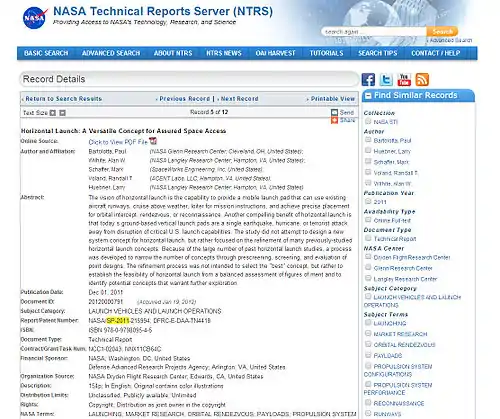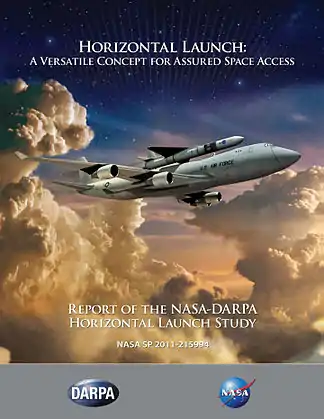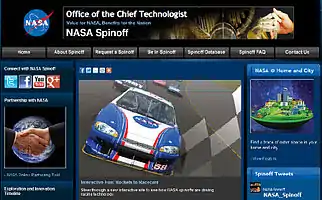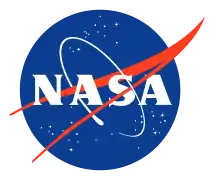NASA STI Program
The Scientific and Technical Information (STI) Program of the National Aeronautics and Space Administration (NASA) collects, organizes, preserves, and releases the Agency's scientific and technical information. STI is derived from NASA's research and development efforts and NASA projects, programs, and missions. The program is essential in helping NASA avoid duplication of research, by sharing information to ensure that the U.S. maintains its preeminence in aerospace-related industries and education.[1] Examples of NASA STI include technical papers and reports, contractor reports, conference papers and proceedings, journal articles, presentations, and technical information on websites. NASA STI also includes research information from NASA's predecessor agency, the National Advisory Committee for Aeronautics (NACA), which dates back to 1915 and transitioned to NASA at the advent of the National Aeronautics and Space Act of 1958 (Amended).[2]
Program Management
The STI Program Office (STIPO) is funded by the NASA Chief Information Officer (CIO) in Washington, DC. The NASA CIO establishes strategic policy and operational measurements for STIPO, which is located at NASA's Langley Research Center in Hampton, Virginia. STIPO is charged to collect NASA STI, organize it into a database, ensure that it is preserved via the National Archives and Records Administration, and release the STI via NASA portals or via other channels, such as science.gov[3] and USA.gov.[4] The STI Program participates in the collaborative Open Government Initiative[5] and is a member of CENDI,[6] which is a partnership of Federal STI managers.
The STI Program is a critical component in the worldwide activity of scientific and technical aerospace research and development. STIPO's charter exists so that NASA STI is promptly and widely released and available, and can be leveraged by NASA, U.S. businesses, government, the public and international entities. This allows NASA to comply with e-Government regulations.[7]
Management and Dissemination of STI
STI is collected and then filed by its content prior to being added to the STI Database for global dissemination. This is a world-class collection of STI that includes over 4 million bibliographic records and a growing number of full-text documents.[1] This database has two segments: The NTRS Registered for registered users, and the NASA Technical Reports Server (NTRS) for publicly available NASA STI.[8]
Accessing the NASA STI Program
The STI website[9] provides products, services and tools to access and benefit from NASA STI.
- Search NASA's public STI collections for reports, conference papers, proceedings, journal articles and other technical and peer-reviewed STI through the NASA Technical Reports Server (NTRS).[8] Integrating other sources, such as NIX (NASA Image Exchange) into its collections, NTRS has:
- More than 450,000 citations to aerospace STI
- Almost 200,000 full-text documents
- More than 500,000 images and videos
- Over 13,000 full-text documents from NASA's predecessor, NACA
- Subscribe to daily STI RSS feeds[10] for the latest technical documents in the STI collection.
- View NASA's subsets of technical imagery and videos through a variety of online media sites[11]
- Locate publishing tools such as the "NASA Publications Guide for Authors"[12] and the popular guide, NASA SP-7084, "Grammar, Punctuation and Capitalization: A Handbook for Technical Writers and Editors,"[13] as well as the NASA Thesaurus and the NASA Scope and Subject Category Guide.[14]
- Learn about and better understand NASA's technical accomplishments via its annual premier publication Spinoff (NASA spin-off)[15] and the Spinoff database of successfully commercialized NASA technology.[16]


Connecting with Users
In addition to the STI website,[9] STIPO uses social media to foster awareness of the Program's activities and latest acquisitions. Presence includes Facebook,[17] Twitter,[18] and YouTube.[19]
References
- "What is the NASA Scientific and Technical Information (STI) Program?". Archived from the original on 2012-06-10.
- NASA Space Act Archived 2008-01-23 at the Wayback Machine
- science.gov website
- USA.gov website
- "Open Government Initiative".
- CENDI website
- e-Government regulations Archived 2008-01-20 at the Wayback Machine
- "NASA Technical Reports Server (NTRS)".
- "STI website".
- STI RSS Feeds Archived 2012-06-10 at the Wayback Machine
- Related content links on the Find STI page of the STI website Archived 2012-06-10 at the Wayback Machine
- "NASA Publications Guide for Authors"
- "Grammar, Punctuation and Capitalization: A Handbook for Technical Writers and Editors"
- STI Tools Archived 2012-06-10 at the Wayback Machine
- NASA Spinoff
- "NASA Spinoff database". Archived from the original on 2019-09-04. Retrieved 2012-05-16.
- "NASA STI Program Facebook page".
- "NASA STI Twitter page".
- "NASA STI YouTube Channel".

